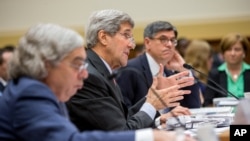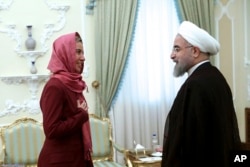Another set of U.S. lawmakers get their chance to question and hear testimony from senior officials Wednesday as they continue to evaluate the international nuclear agreement with Iran.
Secretary of State John Kerry, Defense Secretary Ash Carter, Energy Secretary Ernest Moniz and the Chairman of the Joint Chiefs of Staff Gen. Martin Dempsey are all set to appear before the Senate Armed Services Committee.
The session is due to focus on how the deal affects "U.S. interests and the military balance in the Middle East."
Congress has 60-day period to review the Iran nuclear agreement, and committees in both the House and Senate have been questioning senior members of President Barack Obama's Cabinet, particularly Kerry and Moniz, who were part of the team that secured the deal earlier this month.
House hearing
Kerry told the House Foreign Affairs Committee on Tuesday that a U.S. rejection of the pact would be squandering the "best chance" to control Iran's nuclear program and would leave "no restraints" on Iran developing a nuclear weapon.
"It's a good deal for the world, a good deal for America, a good deal for allies and our friends," Kerry said.
The agreement between Iran and a group that includes the U.S., Britain, China, France, Russia and Germany restrains the Iranian nuclear program in exchange for lifting United Nations and Western sanctions that have hurt the country's economy.
It came after months of negotiations and has been followed by continued engagement between Iranian officials and those from the so-called P5+1.
European Union foreign policy chief Federica Mogherini met with Iranian President Hassan Rouhani Tuesday, and French Foreign Minister Laurent Fabius said Wednesday that France's President Francois Hollande had invited Rouhani to visit France in November.
Timetable
The United Nations Security Council approved the terms of the deal last week, setting off a timetable that could see sanctions lifted by the end of the year.
Congressman Ed Royce, the Republican chairman of the foreign affairs panel, said Tuesday it is "backwards and wrong" that the U.N. voted on the pact before the U.S. Congress completes its review.
Royce also voiced skepticism about the agreement itself.
"Has Iran earned the right to be trusted?" he asked. "If this deal is approved, Iran gets a boost to its international stature.
"We appreciate President Obama's effort to secure the most intrusive inspections in history," Royce said. "But it came up short."
The lead Democrat on the committee, Congressman Eliot Engel, said there are "a number of issues" he finds "troublesome" about the deal.
"Fifteen years from now Iran will be essentially off the hook" for compliance with the agreement, Engel said, a contention Kerry rejected.
Vows veto
Obama has vowed to veto any congressional rejection measure, meaning both the House and Senate would need to muster two-thirds majorities to override the president and refuse to lift congressionally imposed sanctions.
Those sanctions, along with ones put in place by the United Nations and EU, came in response to allegations that Iran was using its nuclear technology to pursue nuclear weapons.
Iran has denied the allegations and insisted the nuclear program is peaceful. It sought sanctions repeal as the main element of the agreement that limits its enrichment activity and subjects its nuclear sites to enhanced U.N. monitoring.







